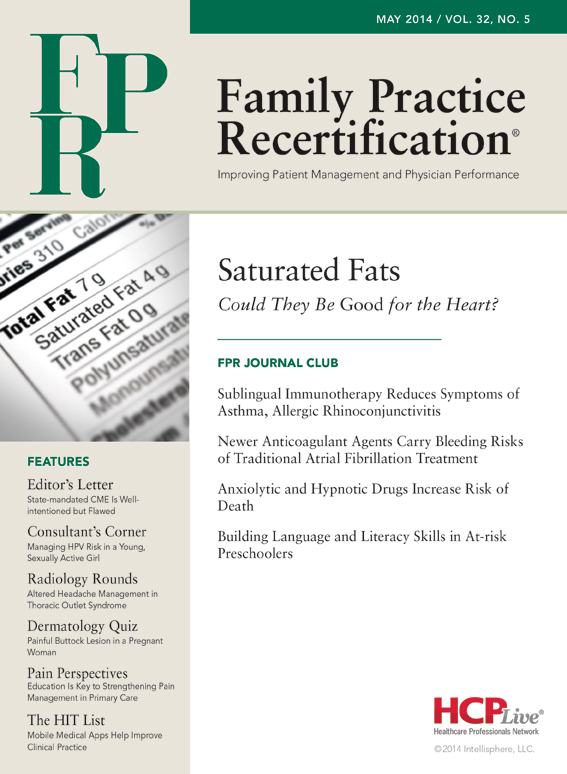Education Is Key to Strengthening Pain Management in Primary Care
Perhaps the greatest obstacle to primary care physicians treating chronic pain is their perception of inadequacy in managing this patient population.

Michael E. Schatman, PhD, CPE
In my previous column, I discussed the issue of who really treats chronic pain in the United States and presented data indicating the answer is primarily primary care physicians (PCPs).1 However, in this column, I will examine why PCPs are generally so uncomfortable with the notion of treating chronic pain.
Perhaps the greatest obstacle to PCPs treating chronic pain is their perception of inadequacy in managing this patient population — an explanation supported by current research data. For example, one study indicated only 15% of PCPs “enjoy” treating patients with chronic pain,2 while another study suggested only 34% feel comfortable in treating this population.3
In a Veterans Administration (VA) study, it was determined that 74% of PCPs reported they had been expected to manage chronic pain conditions that they felt were beyond their scope of practice, training, or experience.4 This is particularly distressing, as VA PCPs are more likely to have multidisciplinary treatment resources available than their non-VA colleagues. What might be the reason for these troubling findings?
As someone who has trained PCPs in pain medicine for many years, my suspicion is that pain management training opportunities for PCPs are virtually non-existent. All of you recall the lack of pain training in your undergraduate medical education, and the adage of “if you missed the 2-hour lecture on pain during your second year of medical school, then you have missed your undergraduate pain education” is typically true.
Although guidelines exist for family practice residency training in chronic pain management,5 there is no evidence suggesting the training programs actually adhere to these guidelines. Additionally, with the exception of primary care sports medicine fellowships, there are no formal training programs that address chronic pain for PCPs.
Rollin “Mac” Gallagher, MD, MPH, explained the cause of this lack of training opportunities well when he wrote, “There is little demand for teaching comprehensive pain medicine skills in training programs because these are focused on teaching reimbursable activities that lead to economically viable practice, not cost-effective practice.”6 When the goal of training becomes remuneration, how can true expertise ever be gained?
The answer to this lack of confidence that results from lack of training is obviously to avail oneself of additional training in treating chronic pain. Although most pain conferences are geared toward researchers and specialists, PAINWeek, Pain Care for Primary Care, and similar events dedicated to clinical pain care develop their programming based on the needs of PCPs — an appropriate move, given the vast majority of attendees are, indeed, PCPs.
While the content presented at these conferences is evidenced-based, the emphasis is placed on “how to,” rather than “what if.” Therefore, I encourage all of you to attend, learn, and develop confidence and expertise as pain managers!
References
1. Breuer B, Cruciani R, Portenoy RK. Pain management by primary care physicians, pain physicians, chiropractors, and acupuncturists: a national survey. South Med J. 2010;103(8):738-47. http://journals.lww.com/smajournalonline/Abstract/2010/08000/Pain_Management_by_Primary_Care_Physicians,_Pain.5.aspx.
2. Potter M, Schafer S, Gonzalez-Mendez E, et al. Opioids for chronic nonmalignant pain. Attitudes and practices of primary care physicians in the UCSF/Stanford Collaborative Research Network. J Fam Pract. 2001;50(2):145-51. http://www.jfponline.com/index.php?id=22143&tx_ttnews[tt_news]=167890.
3. O’Rorke JE, Chen I, Genao I, Panda M, Cykert S. Physicians' comfort in caring for patients with chronic nonmalignant pain. Am J Med Sci. 2007 Feb;333(2):93-100. http://www.ncbi.nlm.nih.gov/pubmed/17301587.
4. Mitchinson AR, Kerr EA, Krein SL. Management of chronic noncancer pain by VA primary care providers: when is pain control a priority? Am J Manag Care. 2008 Feb;14(2):77-84. http://www.ajmc.com/publications/issue/2008/2008-02-vol14-n2/Feb08-2833p077-084/.
5. American Academy of Family Physicians. Recommended Curriculum Guidelines for Family Medicine Residents: Chronic Pain Management. http://www.aafp.org/dam/AAFP/documents/medical_education_residency/program_directors/Reprint286_Pain.pdf.
6. Gallagher RM. Primary care and pain medicine. A community solution to the public health problem of chronic pain. Med Clin N Am. 1999;83(3):555-83. http://www.ncbi.nlm.nih.gov/pubmed/10386115.
About the Author
Michael E. Schatman, PhD, CPE, is a clinical psychologist who has spent the past 27 years working in pain management. He is currently the Executive Director of the Foundation for Ethics in Pain Care in Bellevue, WA, where he also maintains a part-time practice in pain psychology. Schatman is the author of more than 80 peer-reviewed and invited journal articles and book chapters on pain management, and he lectures regularly on both local and national bases. He is the editor of Ethical Issues in Chronic Pain Management and Chronic Pain Management: Guidelines for Multidisciplinary Program Development, both of which were released in 2007. Currently, he is Editor-in-Chief of the Journal of Pain Research, Ethics Section Head Editor of Pain Medicine and Psychological Injury & Law, and Deputy Editor-in-Chief of the International Journal of Cannabinoid Medicine. Schatman serves on the Board of Directors of the American Society of Pain Educators, which named him 2011 Clinical Pain Educator of the Year.
